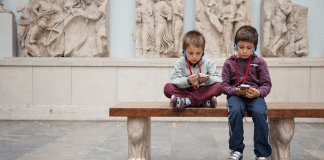 Disabled. If you had asked me twenty years ago what that word meant it would have conjured up the vision of someone in a wheelchair. Someone such as my uncle suffered from polio before there was a cure. Someone who had lost limbs in an accident or perhaps someone who was born into the world under the circumstances not allowing them to function entirely on their own.
Disabled. If you had asked me twenty years ago what that word meant it would have conjured up the vision of someone in a wheelchair. Someone such as my uncle suffered from polio before there was a cure. Someone who had lost limbs in an accident or perhaps someone who was born into the world under the circumstances not allowing them to function entirely on their own.
The reality is disabilities are often unseen, unheard of, and misunderstood. Autism is a perfect example, and thus why autism awareness is so important.
Being disabled means that the person is dis-abled from living within our world with ease and requires accommodations in the form of a wheelchair, hearing aids, quiet corners, fidgets, and reading aids; the list is endless. My understanding of this logic would never have made full sense until I became the loudest and most powerful form of myself for my autistic son.
The timing of World Autism Month reminds me of the similarities and dissimilarities to raising my older son, who is, according to the current world, neurotypical, which is defined as “not displaying or characterized by autistic or other neurologically atypical patterns of thought or behavior.”
If you have met one autistic person, you have met just one autistic person. Generalizing simply will not work. I don’t think any of us are truly neurotypical. I say this not to take away from my younger son’s challenges. However, from a parenting standpoint, so much of what my younger son has already learned about the world, my older son has not. He has already figured out how to identify a genuine person, a skill I wish I had had before my teen years!
As with any struggle, we often reach out to those around us to develop a circle of support.
One such person is my friend Jessica. The mere mention of her name brings up her son’s sweet face, causing me to smile immediately. We know the beauty of our son’s differences and the heartache for what we thought their world would be. But we also see the joy, and through social media, we both feel a little less alone in our respective journeys.
Sure, her son and mine fit some stereotypes people have about autism, but there is so much more. She stated it so perfectly. The brain pathways of those on the spectrum are as different as you and I. Autism is pervasive. Everything an autistic person sees, feels, and experiences is through an autistic lens. It is not better or worse; it is just a different way of processing information and their environment.
If an autistic person says it’s too loud, hot, cold, or bright, it is. If they say it hurts them, it does. It is their experience, not yours. The world needs different types of minds to share ideas, different ways of doing things, new discoveries and inventions. However, the world around us is set up for neurotypical people. We need to normalize and have available accommodations and supports so everyone can thrive, Autistics included.
We are blessed to live in a town with abundant resources, but often you are advocating for the right fit, as autism has no manual. It isn’t a one-type model car. It is a Porsche and a Ford wrapped up together. Our job as their advocate is to cobble together what is best for them. Cumbersome as it might be, that is my role.
Celebrating World Autism Month and even writing about autism as someone who is not on the spectrum comes with controversy, I have learned. Just as with any grouping of people, no organization can properly align with the beliefs of how those individuals want to be represented. I am aware of this as I type this blog. Yet my son isn’t old enough to fully advocate for himself, given the comments and generalizations we have heard about autism. I believe I can do more good than bad by trying to represent him until he can do so fully.
























